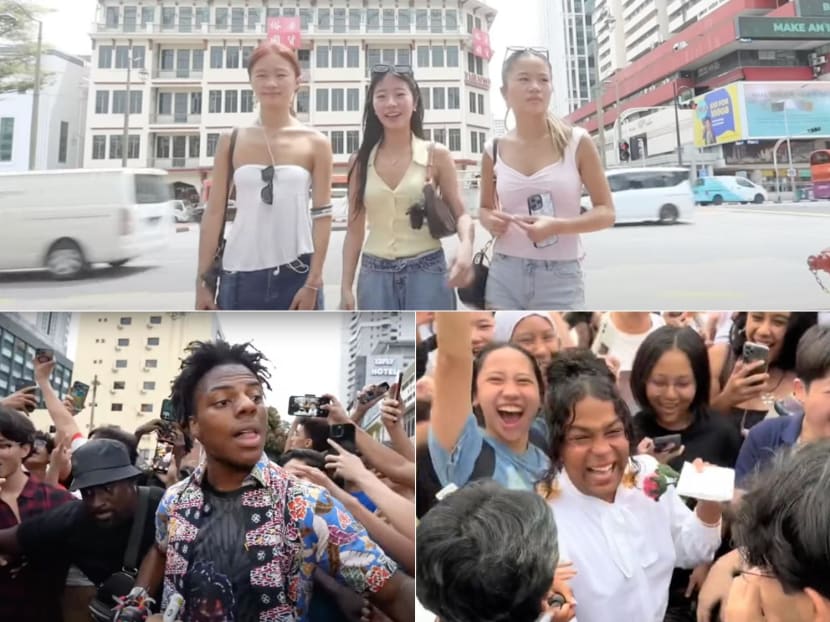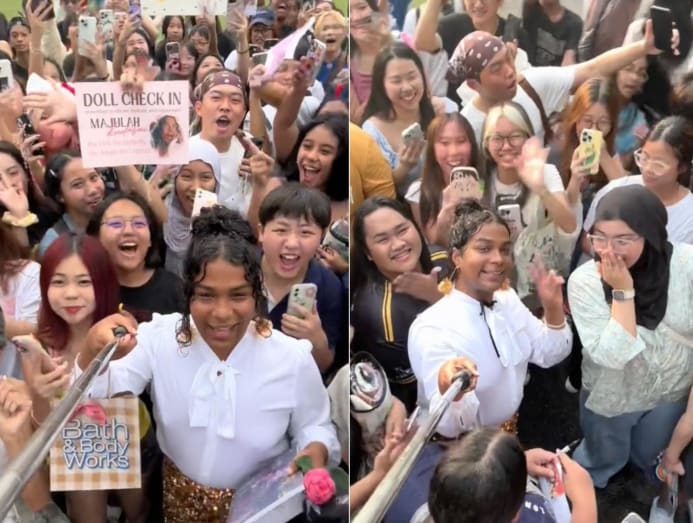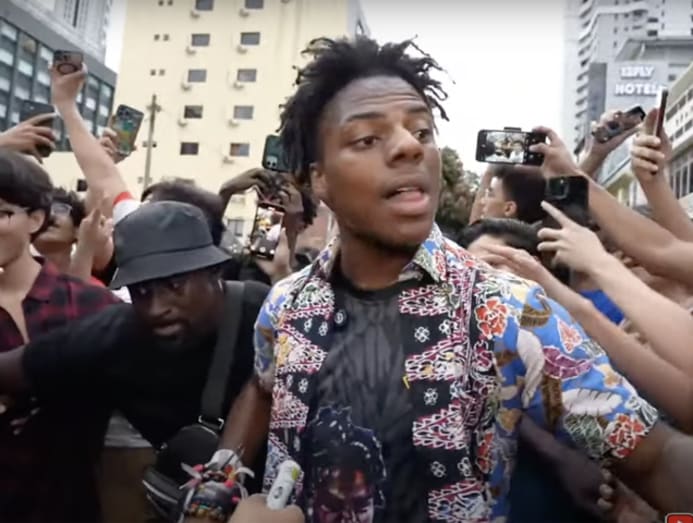Breaking curfews, screaming and stalking: Here's why Singapore youths are going crazy for viral internet personalities

(Clockwise from top) Internet personalities Ha Sisters, "Kudasai Girl" Devin Halbal and IShowSpeed. (Photos: YouTube/HJ Evelyn, YouTube/IShowSpeed, TikTok/hal.baddie)
SINGAPORE — Pandemonium erupted when a black car transporting three VIPs rolled out of Raffles Hotel in June this year, as hundreds of teenage fans who had been waiting for more than six hours surged forward to catch a close-up glimpse of their idols, with some trying to do so by dashing across the road.
Several fans had also entered the hotel earlier in the day to get autographs and hand over gifts. The commotion had security chasing them off the premises, and the police were also called at one point.
The VIPs that evening were not singers or actors, but the Ha Sisters — Evelyn, 25, Erica, 20, and Emily, 15 — who have nearly five million followers on Instagram and more than 6.8 million subscribers on TikTok.
The Korean-American sisters are known for creating video logs about their sisterhood and not much else — they do not sing, dance or showcase any particular talents or skills.
A typical video, for example, shows them doing a food challenge for a day or just snippets of everyday interactions among them.
Among the crowd of adoring fans on June 29, when they came to Singapore, was 16-year-old Samantha (not her real name). She did not want to be publicly identified because she was supposed to be at home that day and her phone was buzzing with dozens of missed calls from her mother.
She told TODAY that she failed to get a selfie with her idols or see them past the tinted windows of the black car, but the teenager said that the experience was worth breaking her 10pm curfew and angering her mother.
"I relate a lot to the Ha sisters because it's like watching my sister and me," she said. "(But) my parents don't really understand why I like them so much."
The Ha Sisters are just one of the many viral internet personalities who have landed on Singapore's sunny shores and sparked a frenzy among their youthful fans who do whatever it takes for a chance to see them in the flesh.
Over the past two weeks, fans of YouTube livestreamer IShowSpeed have shown up in droves to catch a glimpse of him during his travels across Southeast Asia.
The 19-year-old was also said to be travelling to Singapore over the weekend.
His fans have brought chaos and mayhem — arguably on brand with IShowSpeed's over-the-top personality — across the region.
In Malaysia, the media outlets there reported on Wednesday (Sept 18) that a fan allegedly crashed his motorbike while chasing the teenager, and a restaurant was forced to close its shutters as fans mobbed the young man for selfies.
Hundreds of thousands watch his variety livestreams, during which he expresses over-the-top reactions while playing video games, travelling or watching football-related content.
A NEW BREED OF 'CELEBRITIES'
For older parents and those who might not be as chronically online as the younger set, it can be baffling to understand why such public personalities are deserving of fame when their talents are not immediately obvious.
However, to the fans of these internet sensations, it is about the entertainment, relatability and desire to be part of a community that draws them to take on sometimes reckless behaviour commonly associated with traditional celebrities, media and marketing experts said.

In another example, hundreds of fans chanted "kudasai" (Japanese for "please") when 26-year-old Devin Halbal, popularly known as Kudasai Girl, visited Singapore in June.
Her rise to fame? She turned the Japanese word into a catchphrase on TikTok, by simply saying "kudasai" while parading around the world with a selfie stick.
One of her most popular videos has 20 million views, and it shows fans in South Korea dashing across an intersection to get a selfie with the viral wonder. Another video shows them shouting "kimchi kudasai" along with her.
It might seem trivial to some, but for 25-year-old Kenji, who declined to give his full name and works in marketing, Ms Halbal is a "liberating breath of fresh air".
"I like what she stands for... being confident, living life blatantly free and just being herself," he said.
He added that he is a long-time fan who constantly leaves comments on Ms Halbal's TikTok videos, and he claimed that Ms Halbal had privately messaged him about visiting Singapore. Receiving the message surprised him — after all, she has more than 1.1 million TikTok followers.
The Singaporean had stumbled on Ms Halbal's content when she had gone viral sometime in 2022, after coining phrases such as "let dolls be dolls", which was her way of saying people should be allowed to be true to themselves.
Such insider jokes and catchphrases make little sense to outsiders who lack the proper context, but that is exactly part of the appeal of this new breed of "celebrities" because of the "IYKYK" ("If you know, you know") factor.
And do not blame it on Generation Z culture. Media experts noted that celebrities who are famous for unclear reasons have long existed.
Remember the 2000s, when Paris Hilton and the Kardashian family captured the entertainment industry by storm (and continue to do so), even though they were not known for any particular talents.
What has changed is the profile of such personalities and how they are gaining popularity, observers said.
Dr Natalie Pang, head of the communications and new media department at the National University of Singapore (NUS), said that these newer internet sensations come from more diverse backgrounds and they tend to be seen by their audience as being relatable.
It is also easier these days for people to become their fans, with just a click of the "follow" button.
"The era before such platforms were available, people had to rely on legacy media sources, such as reality shows like 'Keeping up with the Kardashians', and they were limited to what the media as well as these personalities presented and showed us," Dr Pang added.
So how does the new breed of internet personalities get famous in the first place?
Senior lecturer Yao Jingxian, deputy head of the marketing programme at the Singapore University of Social Sciences (SUSS), said that they do so by setting trends, making something catchy and getting a little help from the social media channels' algorithms.
"Following the early engagement of audience, in the forms of 'likes', comments or 'shares', algorithms may come into play," Dr Yao explained.
"Social media platforms use algorithms, including mining potentially captivating content and matching viewer profiles, to surface content to viewers."
Not everyone who goes viral, however, necessarily becomes an internet sensation.
Dr Yao added that these content creators need to capitalise on their viral hit and continue engaging their audience to keep them captivated.
What adds to their allure is their engagement with their fans, the experts said, because social media makes it easier for fan interactions through messages and comments, among other things.
These internet personalities do not do this on their own. As they amass large fanbases, a management team or a group of moderators is often behind the scenes.
Ms Emily Ha, for example, is represented by United Talent Agency — a celebrity management company that also represents the likes of American musicians Cardi B and Guns N' Roses, their website states.
HARMLESS FUN OR DANGEROUS ZEALOTRY?
What motivates fans to go all out to meet these internet personalities in person, even mobbing them in public?
Dr Pang from NUS said: "It’s all about the feeling that you are part of something, be it a group, a movement or something authentic and aspirational."
"In the case of Kudasai Girl, she comes across as very authentic, relatable and positive, and the way she interacts and engages with others via TikTok encourages people to come together."

These interactions are not always harmless.
Dr Yao noted that in the case of IShowSpeed, for example, his strong and expressive personality and unconventional content has attracted "enthusiastic followers who see him as bold, charismatic or edgy."
"The followers may feel strongly connected to his expressed attitudes or characteristics and display zealous fandom," Dr Yao added.
Fans are often able to identify livestreamers' locations and stalk them — a phenomenon known as "stream sniping".
This brings about an opportunity for fans to meet their favourite livestreamer face-to-face, which may then make some fans feel like they have clinched an achievement through stalking.
Dr Yao said that there are safety concerns when big crowds gather and some fans might imitate dangerous behaviours.
For the hardcore fans, all of the risks are worth it for the priceless memories of being close to their favourite internet personality, even if few people understand why they are like this.
Samantha, who tried to catch a glimpse of the Ha Sisters, said that she would do it all over again if the siblings were to come back to Singapore.
"My favourite videos are of them in Singapore... there are quite a number of funny moments I rewatch," she said.
"My mum thinks that I shouldn't watch them because she thinks it's distracting and doesn't help with my studies... but I continue watching because they are relatable and funny. I don't think she'll ever understand."









